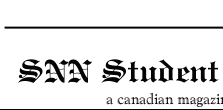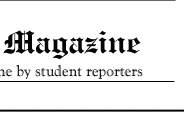|
|
NEWS
"Laying down the cold, hard facts." Gwynn Dyer Speaks to GVC students
By: Julia Klassen, SNN Senior Editor, Grade 11, Garden Valley Collegiate, Winkler MB
"There will be war, but it will not be a world war."
 These were the words of Gwynn Dyer, an internationally known writer and broadcaster as he addressed several hundred senior students at the Garden Valley Collegiate after the recent terrorist attacks. Arrangements for Dyer to speak to students had been made last spring, but could not have come at a better time. Dyer was completely honest with students, laying down the cold, hard facts. "I'm going to be frank," he said, "because you deserve to know." These were the words of Gwynn Dyer, an internationally known writer and broadcaster as he addressed several hundred senior students at the Garden Valley Collegiate after the recent terrorist attacks. Arrangements for Dyer to speak to students had been made last spring, but could not have come at a better time. Dyer was completely honest with students, laying down the cold, hard facts. "I'm going to be frank," he said, "because you deserve to know."
Dyer suggested the military actions would be similar to that of the Gulf war ten years ago. Military operations against terrorists and those countries that harbour them may take three to six months, followed by air and land war involving many other nations providing the Americans with political and military support. The NATO alliance has already decided it will treat this attack on the States as an attack on all members of NATO, which means Canada along with the other 15 countries are committed to making a military response.
The Americans already are talking about being at war, although it is not yet clear with whom. The list of suspects is quickly getting shorter and many leads are pointing to the Middle East, particularly Iraq and Afghanistan and the name Osama bin Laden is surfacing frequently. While comparing the Middle Eastern countries, Dyer suggested Iraq would likely be the easier of the two wars to fight. In this case, military troops could likely invade through the neighbouring country of Turkey (a NATO alliance member.)
He also noted a considerable number of Iraqis would likely welcome this invasion if it meant the end of Iraqi government and Saddam Hussein. Afghanistan would be a much harder target for several reasons. First, it has no NATO member countries neighbouring it's borders, making a land invasion nearly impossible. The largest obstacle however, would not be the geography but the Afghan people, who through the Soviet occupation and ongoing Civil war "have nothing to lose." Dyer also warned "they have a record of fighting hard and have been driven half mad by their years of war." In both cases, the number of casualties would be significant, but more so in Afghanistan.
Dyer also for sees an attitude change taking place in the United States and possibly other Western countries regarding the tolerance of casualties in military action. "In the past, wars have not been about national survival. They have been about solving a problem over the horizon that isn't really affecting our lives. The willingness for our young men to die for this purpose was not accepted".
"If there is war out of this," Dyer concluded, "the Western world will not see it as distant intervention that does not concern them personally. They justly feel as though they have been attacked at home, and must defend themselves against this threat at all costs."
|
|





